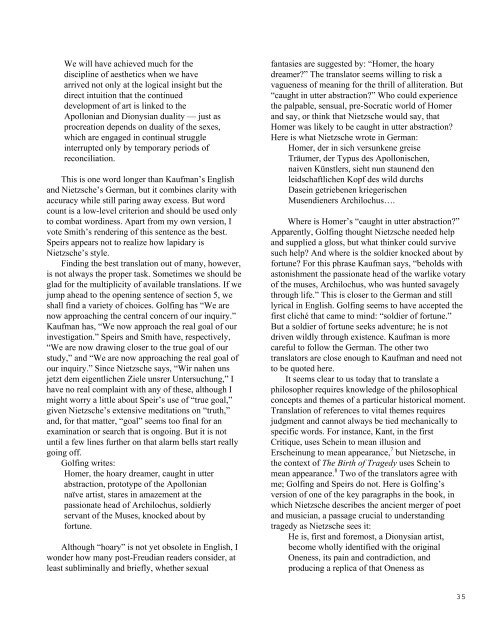their - The University of Texas at Dallas
their - The University of Texas at Dallas
their - The University of Texas at Dallas
You also want an ePaper? Increase the reach of your titles
YUMPU automatically turns print PDFs into web optimized ePapers that Google loves.
We will have achieved much for the<br />
discipline <strong>of</strong> aesthetics when we have<br />
arrived not only <strong>at</strong> the logical insight but the<br />
direct intuition th<strong>at</strong> the continued<br />
development <strong>of</strong> art is linked to the<br />
Apollonian and Dionysian duality — just as<br />
procre<strong>at</strong>ion depends on duality <strong>of</strong> the sexes,<br />
which are engaged in continual struggle<br />
interrupted only by temporary periods <strong>of</strong><br />
reconcili<strong>at</strong>ion.<br />
This is one word longer than Kaufman’s English<br />
and Nietzsche’s German, but it combines clarity with<br />
accuracy while still paring away excess. But word<br />
count is a low-level criterion and should be used only<br />
to comb<strong>at</strong> wordiness. Apart from my own version, I<br />
vote Smith’s rendering <strong>of</strong> this sentence as the best.<br />
Speirs appears not to realize how lapidary is<br />
Nietzsche’s style.<br />
Finding the best transl<strong>at</strong>ion out <strong>of</strong> many, however,<br />
is not always the proper task. Sometimes we should be<br />
glad for the multiplicity <strong>of</strong> available transl<strong>at</strong>ions. If we<br />
jump ahead to the opening sentence <strong>of</strong> section 5, we<br />
shall find a variety <strong>of</strong> choices. Golfing has “We are<br />
now approaching the central concern <strong>of</strong> our inquiry.”<br />
Kaufman has, “We now approach the real goal <strong>of</strong> our<br />
investig<strong>at</strong>ion.” Speirs and Smith have, respectively,<br />
“We are now drawing closer to the true goal <strong>of</strong> our<br />
study,” and “We are now approaching the real goal <strong>of</strong><br />
our inquiry.” Since Nietzsche says, “Wir nahen uns<br />
jetzt dem eigentlichen Ziele unsrer Untersuchung,” I<br />
have no real complaint with any <strong>of</strong> these, although I<br />
might worry a little about Speir’s use <strong>of</strong> “true goal,”<br />
given Nietzsche’s extensive medit<strong>at</strong>ions on “truth,”<br />
and, for th<strong>at</strong> m<strong>at</strong>ter, “goal” seems too final for an<br />
examin<strong>at</strong>ion or search th<strong>at</strong> is ongoing. But it is not<br />
until a few lines further on th<strong>at</strong> alarm bells start really<br />
going <strong>of</strong>f.<br />
Golfing writes:<br />
Homer, the hoary dreamer, caught in utter<br />
abstraction, prototype <strong>of</strong> the Apollonian<br />
naïve artist, stares in amazement <strong>at</strong> the<br />
passion<strong>at</strong>e head <strong>of</strong> Archilochus, soldierly<br />
servant <strong>of</strong> the Muses, knocked about by<br />
fortune.<br />
Although “hoary” is not yet obsolete in English, I<br />
wonder how many post-Freudian readers consider, <strong>at</strong><br />
least subliminally and briefly, whether sexual<br />
fantasies are suggested by: “Homer, the hoary<br />
dreamer” <strong>The</strong> transl<strong>at</strong>or seems willing to risk a<br />
vagueness <strong>of</strong> meaning for the thrill <strong>of</strong> alliter<strong>at</strong>ion. But<br />
“caught in utter abstraction” Who could experience<br />
the palpable, sensual, pre-Socr<strong>at</strong>ic world <strong>of</strong> Homer<br />
and say, or think th<strong>at</strong> Nietzsche would say, th<strong>at</strong><br />
Homer was likely to be caught in utter abstraction<br />
Here is wh<strong>at</strong> Nietzsche wrote in German:<br />
Homer, der in sich versunkene greise<br />
Träumer, der Typus des Apollonischen,<br />
naiven Künstlers, sieht nun staunend den<br />
leidschaftlichen Kopf des wild durchs<br />
Dasein getriebenen kriegerischen<br />
Musendieners Archilochus….<br />
Where is Homer’s “caught in utter abstraction”<br />
Apparently, Golfing thought Nietzsche needed help<br />
and supplied a gloss, but wh<strong>at</strong> thinker could survive<br />
such help And where is the soldier knocked about by<br />
fortune For this phrase Kaufman says, “beholds with<br />
astonishment the passion<strong>at</strong>e head <strong>of</strong> the warlike votary<br />
<strong>of</strong> the muses, Archilochus, who was hunted savagely<br />
through life.” This is closer to the German and still<br />
lyrical in English. Golfing seems to have accepted the<br />
first cliché th<strong>at</strong> came to mind: “soldier <strong>of</strong> fortune.”<br />
But a soldier <strong>of</strong> fortune seeks adventure; he is not<br />
driven wildly through existence. Kaufman is more<br />
careful to follow the German. <strong>The</strong> other two<br />
transl<strong>at</strong>ors are close enough to Kaufman and need not<br />
to be quoted here.<br />
It seems clear to us today th<strong>at</strong> to transl<strong>at</strong>e a<br />
philosopher requires knowledge <strong>of</strong> the philosophical<br />
concepts and themes <strong>of</strong> a particular historical moment.<br />
Transl<strong>at</strong>ion <strong>of</strong> references to vital themes requires<br />
judgment and cannot always be tied mechanically to<br />
specific words. For instance, Kant, in the first<br />
Critique, uses Schein to mean illusion and<br />
Erscheinung to mean appearance, 7 but Nietzsche, in<br />
the context <strong>of</strong> <strong>The</strong> Birth <strong>of</strong> Tragedy uses Schein to<br />
mean appearance. 8 Two <strong>of</strong> the transl<strong>at</strong>ors agree with<br />
me; Golfing and Speirs do not. Here is Golfing’s<br />
version <strong>of</strong> one <strong>of</strong> the key paragraphs in the book, in<br />
which Nietzsche describes the ancient merger <strong>of</strong> poet<br />
and musician, a passage crucial to understanding<br />
tragedy as Nietzsche sees it:<br />
He is, first and foremost, a Dionysian artist,<br />
become wholly identified with the original<br />
Oneness, its pain and contradiction, and<br />
producing a replica <strong>of</strong> th<strong>at</strong> Oneness as<br />
35

















